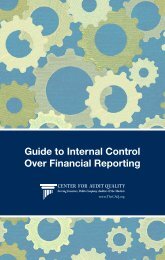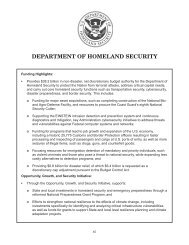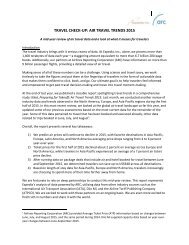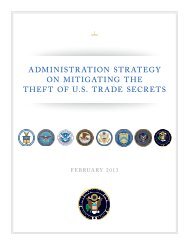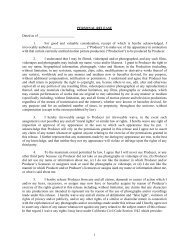A-HRC-13-42
Create successful ePaper yourself
Turn your PDF publications into a flip-book with our unique Google optimized e-Paper software.
A/<strong>HRC</strong>/<strong>13</strong>/<strong>42</strong><br />
page 24<br />
46. Although articles 9 and 14 of the Covenant are not among the non-derogable rights<br />
enumerated in article 4, paragraph 2, the Human Rights Committee confirmed in its general<br />
comment No. 29 that the prohibitions against taking of hostages, abductions or unacknowledged<br />
detention were not subject to derogation. 47 It also considered that it was inherent in the<br />
protection of rights explicitly recognized as non-derogable in article 4, paragraph 2, that they<br />
must be secured by procedural guarantees, including, often, judicial guarantees. The provisions<br />
of the Covenant relating to procedural safeguards could never be made subject to measures that<br />
would circumvent the protection of non-derogable rights. Article 4 may not be resorted to in a<br />
way that would result in derogation from non-derogable rights. Safeguards related to derogation,<br />
as embodied in article 4 of the Covenant, were based on the principles of legality and the rule of<br />
law inherent in the Covenant as a whole. As certain elements of the right to a fair trial are<br />
explicitly guaranteed under international humanitarian law during armed conflict, the Committee<br />
found no justification for derogation from these guarantees during other emergency situations,<br />
and was of the opinion that the principles of legality and the rule of law required that<br />
fundamental requirements of fair trial be respected during a state of emergency. Only a court of<br />
law could try and convict a person for a criminal offence. The presumption of innocence has to<br />
be respected. In order to protect non-derogable rights, the right to take proceedings before a court<br />
to enable the court to decide without delay on the lawfulness of detention should not be<br />
diminished by a State party’s decision to derogate from the Covenant. 48<br />
47. In short, the main elements of articles 9 and 14 of the Covenant, namely the right to habeas<br />
corpus, the presumption of innocence and minimum fair trial guarantees, as well as the<br />
prohibition of unacknowledged detention, must be respected even in times of emergency,<br />
including armed conflict.<br />
48. The Working Group on Arbitrary Detention, in its opinions No. 43/2006, 2/2009<br />
and 3/2009, 49 concurred with the view of the Human Rights Committee that the right to habeas<br />
corpus must prevail even in states of emergency. The Working Group similarly stated that the<br />
right not to be detained incommunicado over prolonged periods of time could not be derogated<br />
from, even where a threat to the life of the nation existed. 50<br />
49. The Working Group on Enforced or Involuntary Disappearances confirmed in its general<br />
comment on article 10 of the Declaration on the Protection of All Persons from Enforced<br />
Disappearance that under no circumstances, including states of war or public emergency, could<br />
any State interest be invoked to justify or legitimize secret centres or places of detention which,<br />
by definition, would violate the Declaration, without exception. 51<br />
47<br />
CCPR/C/21/Rev.1/Add.11.<br />
48<br />
Ibid.<br />
49<br />
A/<strong>HRC</strong>/7/4/Add.1, para. 36, A/<strong>HRC</strong>/<strong>13</strong>/30/Add.1, para. 33 and A/<strong>HRC</strong>/<strong>13</strong>/Add.1/, para. 36.<br />
50<br />
E/CN.4/2005/6, para. 75.<br />
51 E/CN.4/1997/34.






